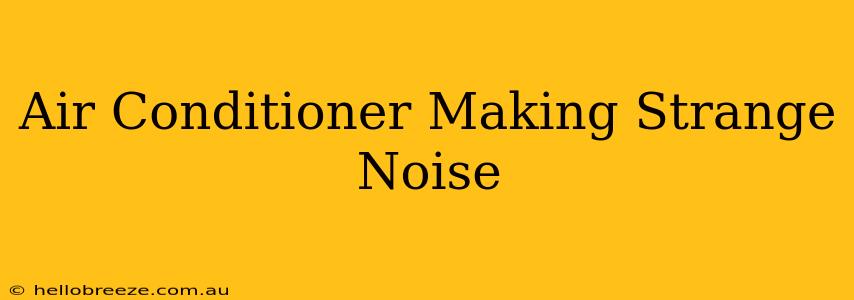Is your air conditioner making strange noises? Don't ignore it! Unusual sounds from your AC unit can indicate a problem that, if left unaddressed, could lead to costly repairs or even system failure. This guide will help you identify common AC noises and troubleshoot potential issues. Knowing what to listen for can save you time, money, and frustration.
Common Air Conditioner Noises and Their Causes
Your AC unit shouldn't be a symphony of strange sounds. Here are some common noises and what they might mean:
1. Clicking or Popping Sounds:
These sounds are often heard when the AC unit turns on or off. Usually, this is perfectly normal, as the internal components expand and contract with temperature changes. However, persistent or frequent clicking could signal a problem with the electrical components, such as a faulty capacitor or relay. If the clicking is accompanied by other issues (like no cooling), it's time to call a professional.
2. Hissing Sound:
A hissing sound typically indicates a refrigerant leak. Refrigerant is crucial for cooling, and a leak will significantly reduce the efficiency of your AC and potentially damage the compressor. This is a serious issue that requires immediate professional attention. Do not attempt to fix this yourself.
3. Gurgling or Bubbling Sounds:
This often indicates low refrigerant levels. The refrigerant can boil and create gurgling noises as it attempts to cool. Again, this necessitates a professional inspection to identify the cause of the refrigerant loss and recharge the system.
4. Grinding or Screeching Sounds:
These noises usually point to a mechanical problem. It could be worn bearings in the fan motor, a failing compressor, or something caught in the fan blades. Ignoring these sounds could lead to significant damage and costly repairs. Contact an HVAC technician as soon as possible.
5. Rattling or Shaking Sounds:
A rattling sound could be due to loose parts within the unit, such as screws or panels. A shaking unit might have an imbalance in the fan or a problem with the mounting brackets. These are often easier fixes, but you may still want a professional to ensure everything is secure and correctly aligned to avoid further damage.
6. High-Pitched Squealing or Whistling Sounds:
These sounds can originate from the blower motor or fan belt. A squealing noise often indicates that the belt is worn or loose, needing adjustment or replacement. A high-pitched whistle can indicate a problem with the blower motor itself.
When to Call an HVAC Technician
While some minor sounds are normal, it's always best to err on the side of caution. Call a qualified HVAC technician if you notice:
- Any unusual or persistent noise that concerns you.
- A significant drop in cooling efficiency.
- The sound is accompanied by other problems, such as unusual smells or leaks.
- You are uncomfortable troubleshooting the issue yourself.
Ignoring problems can lead to more expensive repairs down the line. Regular maintenance and prompt attention to unusual noises can help extend the life of your air conditioner and keep you comfortable throughout the year.
Preventative Maintenance for a Quieter AC
Preventative maintenance is key to avoiding many of the noise issues mentioned above. Regularly:
- Check and clean the air filter. A clogged filter restricts airflow, forcing the system to work harder and potentially leading to increased noise.
- Inspect the outdoor unit. Remove any debris or obstructions around the unit to ensure proper airflow.
- Schedule annual professional maintenance. A technician can identify potential problems before they escalate into major repairs or noisy malfunctions.
By following these tips, you can keep your air conditioner running smoothly, quietly, and efficiently for years to come. Remember, a little preventative care goes a long way!

